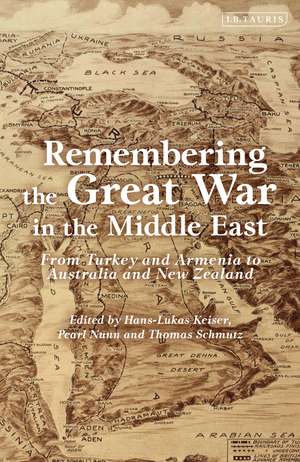Remembering the Great War in the Middle East: From Turkey and Armenia to Australia and New Zealand
Editat de Hans-Lukas Kieser, Thomas Schmutz, Pearl Nunnen Limba Engleză Paperback – 19 apr 2023
| Toate formatele și edițiile | Preț | Express |
|---|---|---|
| Paperback (1) | 193.45 lei 6-8 săpt. | +74.15 lei 4-10 zile |
| Bloomsbury Publishing – 19 apr 2023 | 193.45 lei 6-8 săpt. | +74.15 lei 4-10 zile |
| Hardback (1) | 570.99 lei 6-8 săpt. | |
| Bloomsbury Publishing – 3 noi 2021 | 570.99 lei 6-8 săpt. |
Preț: 193.45 lei
Preț vechi: 250.49 lei
-23% Nou
Puncte Express: 290
Preț estimativ în valută:
37.02€ • 38.51$ • 30.56£
37.02€ • 38.51$ • 30.56£
Carte tipărită la comandă
Livrare economică 14-28 aprilie
Livrare express 07-13 martie pentru 84.14 lei
Preluare comenzi: 021 569.72.76
Specificații
ISBN-13: 9780755639953
ISBN-10: 0755639952
Pagini: 320
Ilustrații: 14 bw illus
Dimensiuni: 156 x 234 x 25 mm
Greutate: 0.45 kg
Editura: Bloomsbury Publishing
Colecția Bloomsbury Academic
Locul publicării:London, United Kingdom
ISBN-10: 0755639952
Pagini: 320
Ilustrații: 14 bw illus
Dimensiuni: 156 x 234 x 25 mm
Greutate: 0.45 kg
Editura: Bloomsbury Publishing
Colecția Bloomsbury Academic
Locul publicării:London, United Kingdom
Caracteristici
Features leading academics on Ottoman history, ANZAC history, Armenian history and genocide from around the globe
Notă biografică
Hans-Lukas Kieser is Professor of Modern History at the University of Zurich, Switzerland. Thomas Schmutz is a scholar based at the University of Zurich, Switzerland.Pearl Nunn is a PhD candidate at the University of Newcastle, Australia. She has a Master of Arts in History from Swansea University, Wales (UK).
Cuprins
Introduction (Hans-Lukas Kieser, University of Newcastle, Australia; Thomas Schmutz, University of Zurich, Switzerland) I. The Politics of Commemoration Chapter 1: Turkish History Writing of the Great War: Imperial Legacy, Mass Violence, Dissent (Alexandre Toumarkine, Institut National des Langues et Civilisations Orientales (INALCO), France) Chapter 2: April 25. Anzac Day Commemoration and Construction of National Identity (Rowan Light, The University of Auckland, New Zealand) Chapter 3: April 24. Formation, Development and Current State of the Armenian Genocide Victims Remembrance Day (Harutyun Marutyan, National Academy of Sciences of Armenia, Armenia) Chapter 4: Unremembering Gallipoli in Turkey (Erol Köroglu, Bogaziçi University, Turkey) II. National Narratives in the former Ottoman World Chapter 5: National Narratives Challenged. Ottoman Wartime Correspondence on Palestine (Yuval Ben Bassat, University of Haifa, Israel; and Dotan Halevy) Chapter 6: Official and Individual Lenses of the Remembrance of the First World War: Turkish Official Military Histories and Personal War Narratives (Mesut Uyar, UNSW Canberra, Australia) III. Australians' Embrace of Gallipoli Chapter 7: Turkey, Australia, and the Noble enemy-turned-friend (Kate Ariotti, University of Newcastle, Australia) Chapter 8: A Foundational Myth: Gallipoli and the Architecture of Memory in Canberra (Daniel Marc Segesser, Bern University, Switzerland) Chapter 9: Gallipoli in Diasporic Memories of Sikhs and Turks (Burcu Cevik-Compiegne, Australian National University, Australia) IV. Contested Memories: New Zealand, Turkey and Armenians Chapter 10: "To have and to hold": Chunuk Bair and New Zealand`s Gallipoli Imagining (Bruce Scates, Australian National University, Australia) Chapter 11: New Zealand and the Armenian Genocide (Maria Armoudian, University of Auckland, New Zealand; James Robins, V.K.G. Woodman)Chapter 12: Can the Survivor Speak? (Talin Suciyan, LMU, Germany) Afterword (Peter Stanley, UNSW Canberra, Australia) Index
Recenzii
Focused on the entangled relation between the Battle of Gallipoli and the Armenian genocide, this excellent collection of studies offers a wealth of thought provoking insights into the legacies of the First World War in Turkey, Armenia, Israel, Australia and New Zealand. This is a timely contribution to our understanding of how the events of 1915 have been remembered, contested and actively forgotten in the service of nation-building, foreign diplomacy and domestic politics in countries seemingly far apart.
